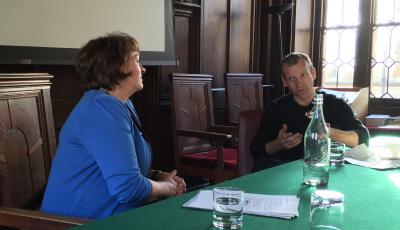A Conversation on Prisons, Criminal Justice and Penal Policy
In this post, DPhil candidate Anna Kotova discusses the recent event with Frances Crook OBE and Dr Jamie Bennett.
Posted:
Time to read:
On 18 February 2016, as part of the Centre for Criminology’s 50th Anniversary Lecture Series, Frances Crook OBE and Dr Jamie Bennett engaged in a conversation about prisons, criminal justice, and penal policy. The event took place at All Souls College.
Ms Crook is the Chief Executive of the Howard League for Penal Reform, one of the leading penal reform organisations in the country, and Dr Bennett is the Governor of HMP Grendon and Spring Hill as well as a Research Associate at the Centre for Criminology. Both have considerable expertise when it comes to prisons and penal policy, and both are thoroughly engaging speakers.

The conversation then turned to penal reform. Dr Bennett discussed the choice reformers have between working within the system and challenging it. This is, of course, a very topical issue, Ms Crook pointed out promptly, since changes have recently been made to the laws pertaining to campaigning organisations that receive government funding, which seek to limit the extent to which such organisations would be able to campaign for reform. She herself admitted she was―and still is―somewhat of a revolutionary, but underscored the importance of being independent, critical, and robust and knowing the limits of what penal reform can achieve. Dr Bennett drew a very interesting parallel using his own experiences as a governor. He felt revolution is not a very British way of changing things; rather, change is usually slow and there are ways of influencing change from within the system. For instance, he discussed how applying prison rules could be done with humanity and understanding, rather than harshly and automatically. In fact, one of the most striking contributions of Dr Bennett to the conversation is this idea of the need for humanity within the criminal justice system. He argued that if we forget the innately problematic nature of imprisonment―or, it could be argued, any method of punishment―we risk losing some of our own humanity. This shows that change can come from within the system.

This seminar was a lively, engaging, and illuminating discussion. Although the two speakers come from very different areas of work, both are dedicated to improving the criminal justice system and adding more humanity to prisons. It became apparent that a campaigner and a prison governor can indeed have much in common, and it’s hoped that their shared call for greater attention to enhancing social justice in the prison system will be heard.
Share:
